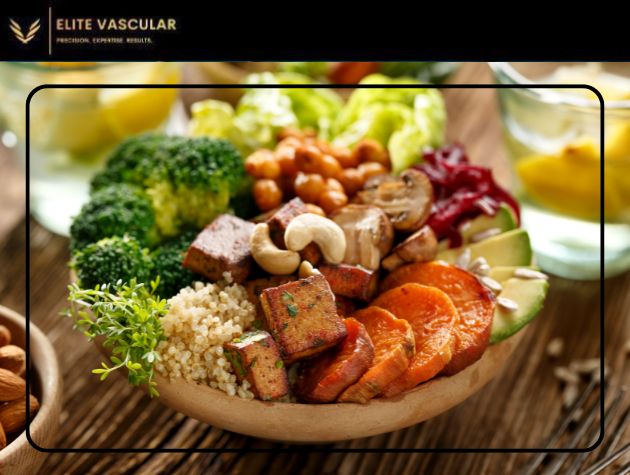Venous insufficiency refers to swollen or inflamed veins that mostly occur in the legs and have difficulty pumping blood toward the heart. The signs of this condition may include leg swelling, varicose veins, and pain in the legs. Compression therapy and exercise are critical therapies, however, a balanced diet also has a significant role in the treatment of venous insufficiency. Eating the right food contributes to the health of the veins, enhances blood circulation, reduces inflammation, and makes dietary changes part of the effective treatment.
The Importance of Eating Balanced Meals
The prevention and control of multiple cardiovascular diseases are also inseparably associated with a proper diet, which adheres to work of vein. High-nutrient food can help improve blood circulation, strong vein walls, and help avoid complications. It is also pertinent that a proper weight control measure via diet reduces the stress exerted on veins alleviating the signs of venous insufficiency.
Foods High In Fiber
Fiber enhances intestinal health and helps to avoid constipation, which raises intra-abdominal pressure and aggravates or may worsen the venous insufficiency. Whole grains, fruits, vegetables, legumes, and nuts are examples of dietary high fibrous foods. Going forward to include such meals in meals assists in normal bowel movements and minimizes strain on the veins.
Antioxidant-Rich Fruits and Vegetables in the diet
Antioxidants are potent substances that assist in limiting the oxidative stress acting on veins thereby preventing weakening of the walls and valves of veins. Antioxidant-rich foods include orange, green, and red fruits and vegetables such as berries, strawberries, oranges, spinach, kale and red pepper containing vitamin C, vitamin E, and flavonoids.
Vitamin C is required for collagen formation important for the structural integrity of veins while flavonoids help in vasodilatation and inhibit inflammatory processes in the body. Regular intake of such foods would therefore be a great savoir for the veins.
Omega-3 Fatty Acids for Circulation
Oily fish species such as salmon, mackerel and sardines are good sources of omega-3 fatty acids which are known for their ability to cause good blood circulation through lowering of inflammatory activity and preventing blood clotting mechanisms. Good plant sources include chia seeds, flaxseeds and walnuts among others. Inclusion of nutrition dense foods in omega 3 fatty acids will assist in improving blood circulation and alleviating the consequences of venous diseases.
Hydration and Its Effect on the Blood Vessels
In order to ensure proper blood viscosity and flow, one must stay hydrated. Dehydration is known to thicken blood making it more difficult for the veins to return to the heart. Throughout the day, drinking sufficient quantities of water can promote proper circulation and decrease swelling. Water intake should be between eight and ten glasses a day, and foods high in water content such as cucumbers, melons, and leafy vegetables should be consumed regularly.
Alleviate Swelling with Foods High in Potassium
Water retention and swelling that comes with venous insufficiency goes down when potassium, an essential mineral, is present in the body. Bananas, sweet potatoes, avocados, leafy greens, and a long list of other foods are rich in potassium. Consumption of such foods is most beneficial for easing the discomfort as well as the symptoms of the disease.
Magnesium for Loosening the Veins
Leg cramping and poor blood flow is improved by taking magnesium, which helps to relax blood vessels. Magnesium is available in several food items including almonds, spinach, pumpkin seeds, and dark chocolate. Pain alleviating from these foods aids in improving the quality of life in general for those with venous insufficiency.
Avoiding Salt and Processed Foods
Soaking of the water and swelling of the legs is frequently aggravated by high sodium intake. Canned foods, which include fast foods and soups, are also high sodium. Salt is better eliminated in the diet by using more fresh unprocessed foods which can also reduce the degree of swelling and promote vein health.
The Importance of Bioflavonoids
Bioflavonoids that can be obtained from onions, tea, fruits, enhance the strength of the veins and blood flow. Together with vitamin C, these compounds are effective in maintaining elasticity of the veins walls. This diet should be followed continuously because there are lasting benefits in the health of veins if bioflavonoids are included in the diet.
Managing Weight through Diet
The weight bearing the excess mass put a lot of pressure on the leg veins. This condition affects venous insufficiency injury progressively. A diet balanced in calories with limited portions containing dense nutrient food would assist in reducing weight and maintaining a healthy weight. Eat whole foods together with lean meat, healthy oils and complex carbohydrates as the ultimate long term solution.
Supplementation for Veins
Interestingly, under certain circumstances, dietary supplements may aid in having a healthy diet. According to research, horse chestnut extract, grape seed extract, and rutin may have beneficial effects to veins. It is also advised to seek medical advice from the doctors before adopting this dietary approach which may be safe and effective.
Combining Diet with Other Treatments
Diet is important in the management of venous insufficiency, but its effectiveness is greatly enhanced by other treatment modalities such as exercise, wearing compression garments, and maintaining fluid intake. A comprehensive approach will help in reducing symptoms and improve the general state of the veins.
Conclusion
An adequate intake of food is helpful in the management of venous insufficiency as it promotes venous patency, assists in blood flow, and decreases inflammation. Adding healthy foods to your diet, drinking enough water, and steering clear of processed foods are simple ways to manage symptoms and avoid further complications. Medical professionals advise that complementing diet with other forms of treatment can make the patient’s life easier and healthier.
